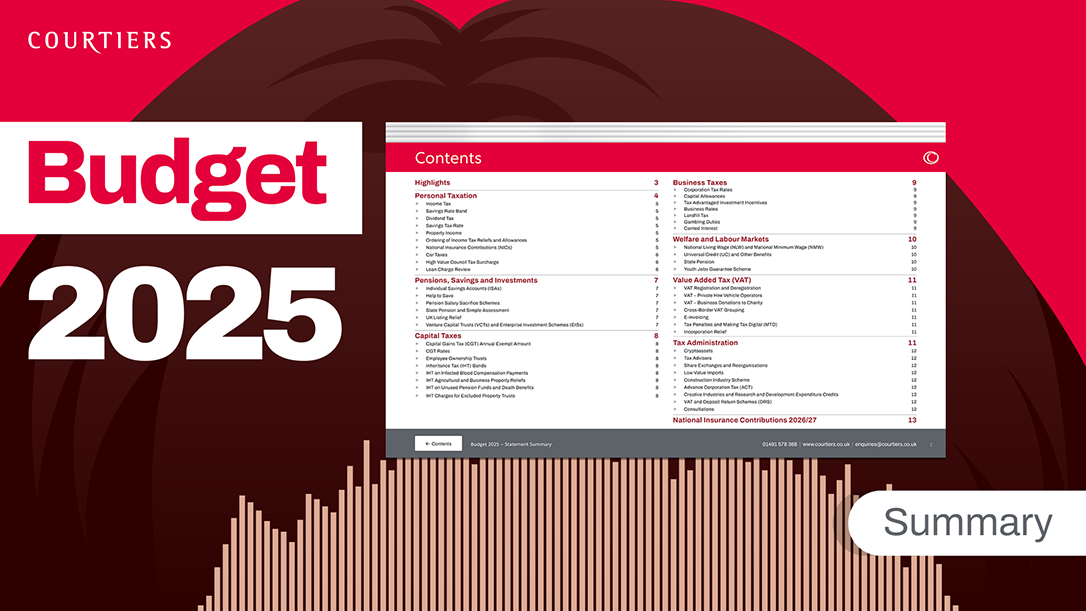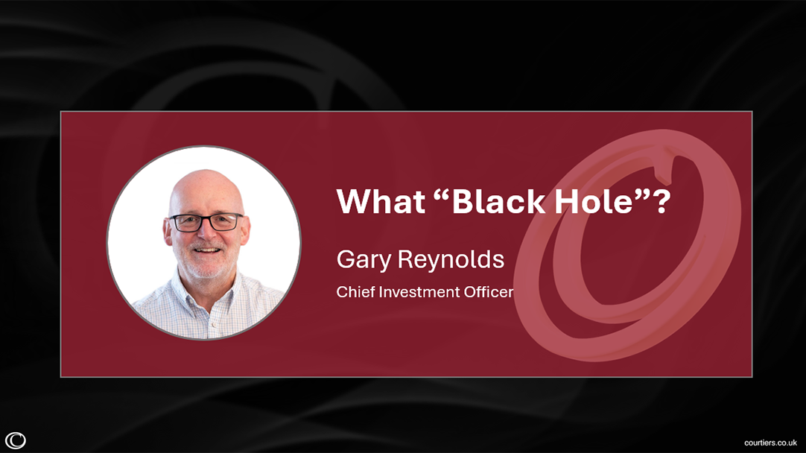Yesterday, we said “the devil would be in the detail” when it came to understanding how the changes Rachel Reeves announced in the Autumn Budget 2025 would affect you. Today, we’ve pulled together a budget summary, explaining Labour’s decisions.
Whether you reviewed the government’s Budget documents, the OBR’s November 2025 “Economic and fiscal outlook” or haven’t had a chance, we’re pleased to offer you a summary of the changes in the Budget, so you can understand what could affect you.
Yesterday, Gary Reynolds (Chief Investment Officer), Kapil Divecha (Head of Private Clients) and Sagar Dholiwar (Head of Corporate Clients) shared their immediate thoughts about the budget:
“She’s broken every election promise and blamed the Tories for everything.” – Gary Reynolds, Courtiers Chief Investment Officer
Gilts and the Markets:
Gary Reynolds (Chief Investment Officer) watched the markets in real time as Rachel Reeves delivered her budget, saying the following:
“I plot the markets in real time. Gilt yields came down when she was on her feet, that’s good, and the market went up. It came down when the OBR thing got released,”
Sagar Dholiwar (Head of Corporate Clients) noted that he saw the gilt yields as well, and that they had come down by the time we did the podcast.
Gary responded, agreeing, and adding that “[Rachel Reeves] was moaning about Liz Truss crashing everything. But the gilt yields that really matter for mortgages, the longer dated ones, 20-year gilt yields are a lot higher now than they were when Liz Truss crashed the economy… there’s so much inaccuracy that’s pushed around.”
What was in – and not in – the Budget:
“For me, I think it really reassures and sort of provides me confidence in terms of what we were telling clients ahead of the budget.” – Kapil Divecha, Head of Private Clients
For Kapil, he was more focused on the Salary Sacrifice cap, Income Thresholds and what was not in the budget:
“We had a lot of client queries about the level of Pension Commencement Lump Sum (PCLS)… and we were explaining to clients that obviously we won’t know till the budget’s announced, we’ll give advice off the back of that. That was good advice because nothing changed on the PCLS and had people taken that, it would be back inside their estate.
“There’s the cap on salary sacrifice for us as well, £2000. We need to look at the rules around this, but does it mean they can still contribute elsewhere? We need to find out the rules and go through that detail. But there’s some planning opportunities there that we’ll have to consider.
“And then obviously the fact that the income thresholds have been frozen again for another three years. So effectively that’s stealth tax. Clients are effectively paying more tax unknowingly. When your income is increasing by inflation, generally you’re going to be earning more, so you will potentially be being pushed into higher rate bands.”
Property, Dividends and Pensions:
“I was expecting a major announcement on something. I really thought that she was going to go big on a particular area of tax.” – Sagar Dholiwar, Head of Corporate Clients
Finally, Sagar Dholiwar (Head of Corporate Clients) discussed property savings and dividend tax, before explaining more around Salary Sacrifice from an employee and employer perspective:
“Dividend tax is increasing by 2%, which [means] it’s now going to be 10.75% for basic rate and it’s going to be 35.75% for higher rate taxpayers. So, aligning the taxes a little bit more closely. Still a little bit more beneficial for basic rate taxpayers.
“But the property income tax, clearly if you’ve got properties and you’re receiving rental income, that’s an area …[that] sits up for grabs and they [Labour] are going to continue to increase the tax on second property owners and other portfolio property owners. They want to free up houses, and they don’t want landlords to be hoarding the property market for their own personal gain. So, I can see why she’s done that, and I suspect that’s only ever going to increase really with the direction of what the government’s trying to do there.
“The other area, which was disappointing for me, was the salary sacrifice cap. For employees and employers, it’s a fantastic way to boost your pension pot. Now, salary sacrifice allows employees to exchange part of their salary for an enhanced employer pension contribution. So, it’s a great way to save income tax and National Insurance to boost your pension. But most importantly, the employers also save National Insurance by not putting that money or paying that money out as income to that individual.
“Now, the combination of the income tax saving and the national insurance savings for employees and the national insurance savings from the employer also being passed on to the pot can make a significant difference to people’s pensions each year.
“So, reducing the tax relief in this way is, to me, it’s just making savings into pensions a little less attractive. I think they’re going to introduce this from April 2029. So, they know it’s going to involve quite a few fundamental changes to systems and to make it clear for everyone exactly what’s happening.”
You can hear the full conversation, as well as thoughts on Cash ISAs, the so-called ‘Mansion Tax’ (the High Value Council Tax Surcharge) and Gary’s own opinions around GDP growth below, as well as by listening through Spotify or Apple, or wherever you get your podcasts.













